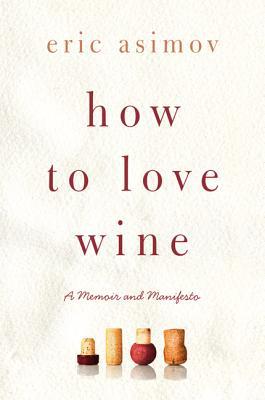

| HOW TO LOVE WINE A Memoir and Manifesto Eric Asimov New York: William Morrow, October 2012 |
Rating: 5.0 High |
|||
| ISBN-13 978-0-06-180252-2 | ||||
| ISBN 0-06-180252-2 | 278pp. | HC | $24.99 | |
No one feels they have to be conversant with the varieties of spud species before enjoying potatoes au gratin. Expecting someone to have taken a course in marine biology before eating fish would be ridiculous. Yet many people embarking on the purchase of a bottle of wine, or when ordering one with a meal in a restaurant, feel inadequate if they lack the corresponding acumen about varietals and vintages.1
"I think everybody knows how it feels to be put on the spot like this. I know when I've been charged with tasting the wine at a meal with famous collectors or wine writers I've experienced performance anxiety, too. This fear of being mistaken, of being wrong, or of simply not understanding what's going on, pervades the world of wine, where such a premium is placed on knowing everything and always being right." – Pages 2-3 |
Eric Asimov, wine critic for the New York Times, wrote this book to lay such wines anxieties to rest. He points out that winemaking has become far more common, good wines far more widely available and affordable; but the prospect of building even a modest wine collection still engenders awe.
"It bears repeating: The primary purpose of wine is to provide pleasure and refreshment. It can do much more than that, but should never do less. With a mission so seemingly simple, I ask again, Why is it that wine and its trappings seem so often to breed a feeling of inadequacy?" – Page 8 |
Asimov drives the point home in these 278 enjoyable pages. Writing in a breezy style, he provides details of his career, from his graduate-student days at UT Austin to his current position as chief wine critic for the New York Times. Along the way he introduces his readers to some great wines, like the memorable 1978 Conterno Barbera d'Alba which he bought for $82 while doing his graduate work in Austin, and some great winemakers like Aubert de Villaine, codirector of the exalted Domaine de la Romanée Conti. And he debunks a number of the myths that have grown up around the wine industry in recent years: notably that the "tasting notes" mean anything, that scores are always a reliable guide to the quality of a wine.
But Asimov's principal message is that the complexity and variability of good wines make them impossible to pin down with a rating or a brief description, and that the way to handle them is not to seek mastery over them but to work with them as with a living being, whether in the making or the drinking. For wines are living and changing liquids even after being bottled. Some start out barely drinkable but age well, only developing full quality after a decade or so in the rack. Others are tastiest when first bought. Vintage makes a difference, of course; the vagaries of weather profoundly affect the grapes. But vintage is only one of many factors influencing the quality of a wine. Conditions of the soil where its grapes are grown, conditions in the cellar where it's stored, do too. And the enjoyment of any wine depends on the context in which it's enjoyed.
The book is well written, with plenty of lore on the world of wine, its great vintages and vignerons, its critics outré and sensible, and citations for its reliable reference books. It has a good index and very few grammatical errors. I wouldn't call it a keeper; read it, enjoy it, note down any information you find useful (perhaps a reference, or one of the many vintages mentioned), then pass it along. But I recommend it with my highest rating.3

 To contact Chris Winter, send email to this address.
To contact Chris Winter, send email to this address.